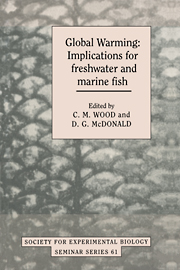Book contents
- Frontmatter
- Contents
- List of contributors
- Preface
- Temperature thresholds for protein adaptation: when does temperature start to ‘hurt’?
- Membrane constraints to physiological function at different temperatures: does cholesterol stabilize membranes at elevated temperatures?
- The effect of temperature on protein metabolism in fish: the possible consequences for wild Atlantic salmon (Salmo salar L.) stocks in Europe as a result of global warming
- Thermal stress and muscle function in fish
- Factors which may limit swimming performance at different temperatures
- Effects of temperature on cardiovascular performance
- Temperature effects on the reproductive performance of fish
- The effects of temperature on embryonic and larval development
- Temperature and growth: modulation of growth rate via temperature change
- Effects of climate change on cod (Gadus morhua) stocks
- Temperature effects on osmoregulatory physiology of juvenile anadromous fish
- Effects of temperature on xenobiotic metabolism
- Interactive effects of temperature and pollutant stress
- Behavioural compensation for long-term thermal change
- Thermal niche of fishes and global warming
- Index
Preface
Published online by Cambridge University Press: 05 November 2011
- Frontmatter
- Contents
- List of contributors
- Preface
- Temperature thresholds for protein adaptation: when does temperature start to ‘hurt’?
- Membrane constraints to physiological function at different temperatures: does cholesterol stabilize membranes at elevated temperatures?
- The effect of temperature on protein metabolism in fish: the possible consequences for wild Atlantic salmon (Salmo salar L.) stocks in Europe as a result of global warming
- Thermal stress and muscle function in fish
- Factors which may limit swimming performance at different temperatures
- Effects of temperature on cardiovascular performance
- Temperature effects on the reproductive performance of fish
- The effects of temperature on embryonic and larval development
- Temperature and growth: modulation of growth rate via temperature change
- Effects of climate change on cod (Gadus morhua) stocks
- Temperature effects on osmoregulatory physiology of juvenile anadromous fish
- Effects of temperature on xenobiotic metabolism
- Interactive effects of temperature and pollutant stress
- Behavioural compensation for long-term thermal change
- Thermal niche of fishes and global warming
- Index
Summary
While the details of climate change and global warming remain subjects of intense debate, there is a growing awareness that the earth's temperature regime is changing, as a result of either natural variation or anthropogenic emissions of ‘greenhouse gases’. The effects of warming scenarios on agriculture, human health and vegetation have been extensively studied over the past decade, but there has been remarkably little research on the anticipated effects on fish and fisheries. This is somewhat surprising, given the fact that temperature is undoubtedly the most thoroughly studied environmental variable in fish biology! Fish are poikilotherms living in a medium of high heat capacity and conductance; their body temperature is normally within a few fractions of a degree of the water, and therefore the rates of all of their biological functions are critically dependent on environmental temperature.
A few years ago, as we started our own research programme in this area, we came to realize that there existed only a modest amount of information on the long-term effects of small temperature increments on fish. Nonetheless, there was also clearly available a wealth of classical data on ‘temperature effects’ from which extrapolation and speculation could be made. We thought it would be useful to bring together experts from all areas of fish biology, and ask them to summarize the existing information, to identify significant gaps in current understanding, and to speculate, based on their knowledge of the field, on the responses of fish to chronic small increments in temperature superimposed on natural regimes.
- Type
- Chapter
- Information
- Global WarmingImplications for Freshwater and Marine Fish, pp. xiii - xviPublisher: Cambridge University PressPrint publication year: 1997

